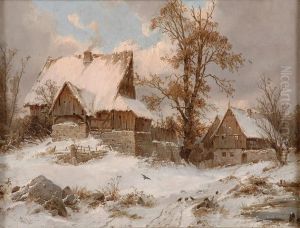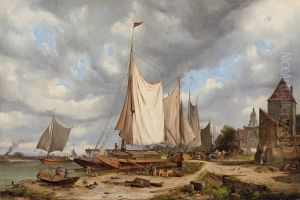Carl Julius Leypold Paintings
Carl Julius Leypold was a German painter born on August 20, 1806, in Weimar, Germany. He is known for his landscape and animal paintings, which are characterized by their detailed realism and sensitivity to the natural world. Leypold's work reflects the Romantic movement's influence, emphasizing the beauty and majesty of nature.
Leypold received his early education in Weimar, where he was initially influenced by the German Romantic painter Caspar David Friedrich. He furthered his studies at the Dresden Academy of Fine Arts, where he was exposed to the works of other Romantic artists and developed his technique. Throughout his career, Leypold focused on capturing the German countryside's enchanting landscapes, often incorporating animals and human figures to add life and narrative to his scenes.
Despite his talent and contributions to the Romantic movement, Leypold did not gain the same level of fame as some of his contemporaries. However, his work was appreciated by those who valued the Romantic ideals of emotion, nature, and individualism. Leypold's paintings are notable for their attention to detail, use of light, and the atmosphere of tranquility and contemplation they evoke.
Carl Julius Leypold died on December 22, 1874, in Dresden, Germany. Today, his works are held in various collections and museums, serving as a testament to his skill and dedication to capturing the beauty of the natural world. Through his paintings, Leypold has left a lasting legacy as a representative of the Romantic movement in German art, celebrating the unspoiled landscapes and the emotional depth of nature.



